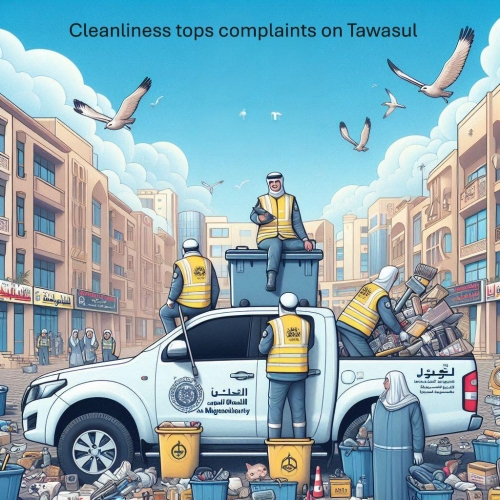Cleanliness has emerged as a top concern in Bahrain, with 51% of all complaints and inquiries received through the “Tawasul” citizen feedback system related to cleanliness issues. The system recorded a total of 938 complaints, with the Northern Governorate Municipality receiving the highest number of cleanliness-related complaints at 406. Other common issues reported included rainwater accumulation, abandoned vehicles, construction debris, and sanitation concerns.
Complaints about inspection and supervision ranked second, with 123 reports making up 14% of the total complaints. Concerns related to municipal fees and charges followed closely behind, with 93 reports representing 10% of all complaints. In the Capital Municipality, improper waste disposal was the most frequent complaint, with 39 reports. Complaints about public markets and waste bin placements were relatively rare, each receiving only three complaints. Overall, the Capital Municipality recorded 189 complaints and 37 inquiries across all categories.
Muharraq Municipality saw municipal fees as the primary concern, with 38 complaints and inquiries. Sanitation issues and housing certificate inquiries were less common, averaging three per category. Muharraq had a total of 109 complaints, including 35 inquiries. The Northern Governorate Municipality, leading in total complaints, had a total of 406 complaints, including 34 inquiries. The Tawasul system is an essential tool for residents to provide feedback and raise concerns about issues impacting their communities.
It is crucial for municipalities to address cleanliness concerns promptly and effectively to maintain the overall well-being of residents. Improper waste disposal, abandoned vehicles, and construction debris not only negatively impact the aesthetics of a neighborhood but also pose health and safety hazards. Municipalities must prioritize inspection and supervision efforts to ensure compliance with regulations and prevent the accumulation of waste and debris in public spaces.
Additionally, addressing concerns related to municipal fees and charges is essential to ensure transparency and fairness in local government operations. By actively responding to citizen feedback and resolving issues in a timely manner, municipal authorities can build trust with residents and enhance the quality of life in their communities. The Tawasul system serves as a valuable platform for citizens to voice their opinions and hold authorities accountable for addressing their concerns.
Moving forward, it is essential for municipalities to continue to monitor and address cleanliness issues, inspection and supervision concerns, and municipal fee disputes to create cleaner, safer, and more livable communities for all residents. By working collaboratively with residents and utilizing the feedback provided through the Tawasul system, local authorities can make informed decisions and implement solutions that benefit the community as a whole. Cleanliness should remain a top priority for municipalities in Bahrain to ensure a high standard of living for all residents.































